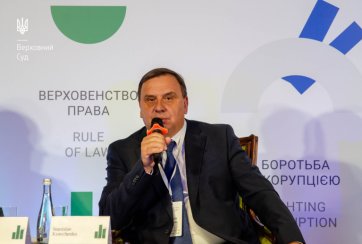Contact center of the Ukrainian Judiciary 044 207-35-46

Understanding the importance of developing case law in the spirit of European Union law, the Supreme Court is trying to be as actively involved in the European integration process at all its stages as possible. Since the beginning of a new phase of this process, namely negotiations on Ukraine's accession to the EU, the Supreme Court has been making every effort and providing comprehensive assistance to achieve this important goal for the state.
This was stated by President of the Supreme Court Stanislav Kravchenko during an event dedicated to discussing the course of the European integration process and analysing the current state of fulfilment of EU requirements.
The SC President reminded that on 17 September 2024, the second bilateral Ukraine-EU session took place as part of the screening of the compliance of Ukrainian legislation with EU law. The Ukrainian delegation included Myroslava Bilak, Judge of the Administrative Cassation Court of the Supreme Court, and Rasim Babanly, First Deputy Chief of Staff, Head of the Department for Analytical and Legal Work.
During the meeting in Brussels, dedicated to the negotiating chap. 23 ‘Justice and Fundamental Rights’, the representatives of the Supreme Court highlighted the administration of justice in times of war, focusing on the achievements of the judicial system and the challenges it faced, and outlined the prospects for creating a new map of courts and ensuring citizens' access to justice, in particular in the context of administrative disputes.
‘Now we are waiting for feedback and clearly understand what we have to do next. The task of the Supreme Court is primarily to ensure the unity of case law, and we have already made significant achievements in this regard. The mechanism of case review by chambers, joint chambers of cassation courts and the Grand Chamber of the Supreme Court has made it possible to resolve a large number of legal issues that have not been resolved in court practice for a long time,’ Stanislav Kravchenko said.

The President of the Supreme Court also drew attention to the need to find ways to improve cassation filters. The issue of this procedural tool was also one of the key topics discussed during the EU-Ukraine session in Brussels.
The Supreme Court receives more than 90,000 cases every year, and almost half of them are cases of administrative jurisdiction. Therefore, it is necessary to look at this problem systematically and look for the best way to resolve this issue, study the relevant experience of EU countries and rethink national legislation.
Stanislav Kravchenko also noted that, in addition to applying the ECHR case law when considering cases, judges of national courts have been actively studying and analysing the case law of the EU Court of Justice for at least the last two years.
‘There is criticism that we are in a hurry. However, we are doing the right thing, because these are the steps that help us to consistently move forward in the European integration process. In addition, it is a guideline for shaping the national judicial practice and lawmaking process. We are making considerable efforts to ensure that our country is established as a democratic state that develops in accordance with the rules of the European community,' the Supreme Court President summed up.

According to Rasim Babanly, First Deputy Chief of Staff, Head of the Department for Analytical and Legal Work, it is important to understand that the ultimate beneficiary of the European integration process is primarily Ukraine itself, its citizens and, ultimately, the public authorities, which are given the opportunity to improve themselves.
The European Commission provided the Ukrainian authorities with an extensive list of issues to be addressed through self-screening, as the Ukrainian delegation had to not only highlight the state of legislative regulation of certain aspects of the courts' work, but also identify a range of problematic issues and identify potential solutions.
‘On the one hand, the problem is a negative, but on the other hand, it is a certain point of growth, because solving the problem allows public authorities and the legal system as a whole to develop effectively. It is the sustainable development of the judiciary that is our main vision of how we need to act in order to meet EU requirements. Based on the results of the screening analysis, we expect a report on the basis of which Ukraine should develop a roadmap. In it, we will focus on the growth points that we need to achieve and by which the European Union will assess our progress in gradually moving towards compliance with EU requirements,’ said Rasim Babanly.
The event ‘Ukraine's path to the EU: key findings from the Shadow Report on Chapter 23 “Justice and Fundamental Rights” and the Second EU-Ukraine Bilateral Session on Chapter 23 (Cluster 1 “Fundamentals of the EU Accession Process”)’ was organised by a coalition of NGOs with the support of the European Union's Pravo-Justice project.
